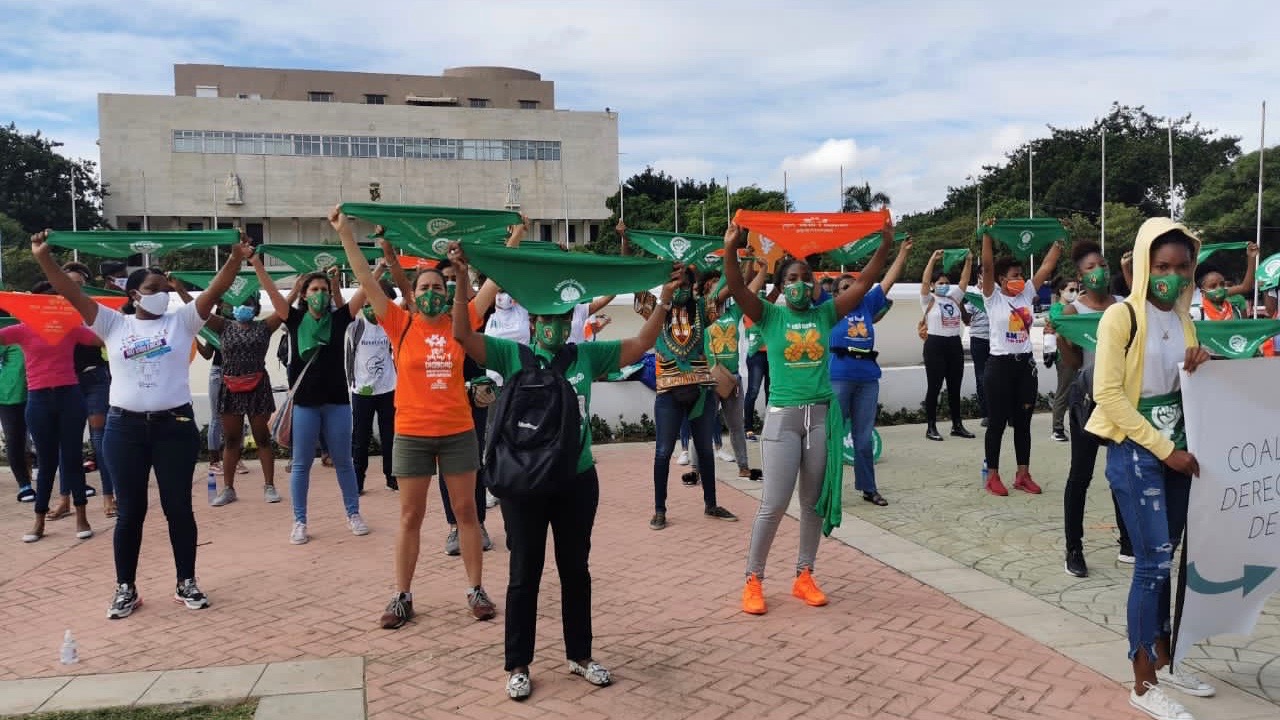Feminist movements and social organizations from across Dominican Republic, on December 16, organized a ‘Green Day for the Life, Health and Dignity of Women and Young Girls’. It was organized to demand the inclusion of femicide and other forms of violence against women as punishable offenses, and the right to abortion under certain conditions in the new penal code.
Throughout the day, various protest actions were carried out to demand guarantees for women’s rights in the Caribbean country. In the capital Santo Domingo, in the morning a pañuelazo and in the evening a candle light march was held in front of the National Congress. Additionally, thousands of women from across the country took part in the virtual pañuelazo and shared photos of green scarves along with messages demanding recognition of women’s rights. Pañuelazo is a march with green scarves, which represents the feminist struggle for legal abortion.
The call for the protest day was given by the Feminist Forum of Dominican Republic and the Coalition for Life and Rights of Women, made up of more than 80 social organizations.
Pañuelazo frente al @CongresoRD exigiendo despenalización del #Aborto3Causales en el #CódigoPenal. pic.twitter.com/cyacRMWa6b
— CoaliciónPorMujeres (@CoalicionxMujer) December 16, 2020
Pañuelazo frente al @CongresoRD. Por la vida, la salud y la dignidad de las mujeres: #Aborto3Causales en el #CódigoPenal. pic.twitter.com/uIP0DVMEsr
— Foro Feminista RD (@ForoFeministaRD) December 16, 2020
Dominican Republic has some of the most conservative legislation around abortion in the region. Abortion is illegal in the country in all circumstances, without any exception. Feminist movements are demanding that abortion is legalized in three cases: when the pregnancy puts the woman’s life at risk, when there is a malformation of the fetus that prevents life after birth or when pregnancy is the result of rape or incest.
Dominican women have been demanding decriminalization of abortion for more than twenty years. The organizations have urged President Luis Abinader not to approve the new penal code without including this integral right. The bill on the new penal code is being debated in the chamber of deputies or the lower house of the parliament.
During his election campaign, Abinader promised that he would support the right of women to terminate a pregnancy in valid cases. However, deputy Alexis Jiménez, the president of the chamber of deputies of the ruling Modern Revolutionary Party (PRM), decided to present a draft penal code that does not include this right. Jiménez proposed to discuss the abortion rights in a special general law bill.
The movements have announced to mobilize continuously throughout the national territory before the intention of legislators to keep abortion rights out of the penal code.
“We announce that we declare ourselves in permanent mobilization before all powers, throughout the national territory. The damage that this action of the legislative power represents, with the complicit silence of the executive power, affects not only women, but society as a whole, which is why we call on all organizations to mobilize together with women and raise their voice of protest and resistance in the face of this perverse conspiracy,” said the Coalition in a statement.
Dominican Republic is also one of the nations in the region with the highest indexes of gender-based violence such as femicide, rape of minors, and adolescent pregnancies. Organizations allege that poor and working-class women in the country are the most hard hit by this violence and that a necessary step to combating this on all levels is through comprehensive sexual education.
The conservative and patriarchal character of the country is also reflected in the fact that on Wednesday, December 16, the senate finally approved a civil code bill that eliminates child marriage in the country after being debated for several years.





